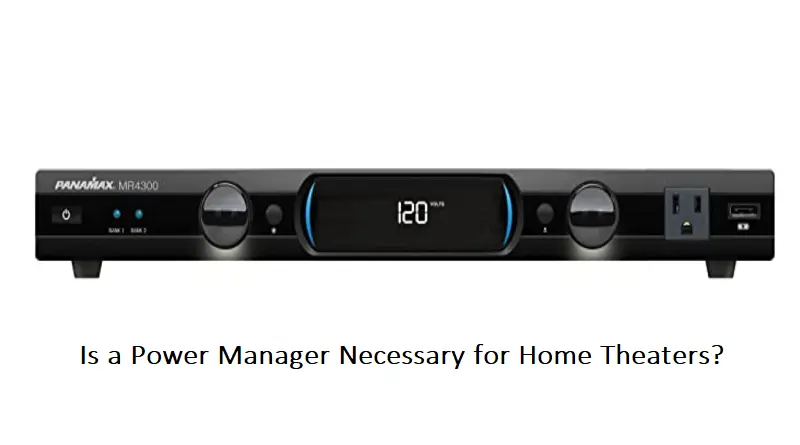Is a Power Manager Necessary for Home Theaters? Indulging in your beloved movies and TV shows within the cozy confines of your own home is an unparalleled experience, and home theaters provide just that.
But many high-powered devices typically present in home theaters can be susceptible to damage from power fluctuations.
To safeguard your valuable equipment from potential harm, you may ponder whether a power manager is a requisite for your home theater setup.
What Is a Home Theater Power Manager?
A home theater power manager is designed to manage and regulate the power supply to various home theater system components.
It typically serves as a central hub or control unit for all the electronic devices in a home theater setup, such as televisions, receivers, amplifiers, media players, and gaming consoles.
The main purpose of a home theater power manager is to provide surge protection, voltage regulation, and power distribution to protect sensitive electronic equipment from power surges, voltage fluctuations, and electrical interference.
A home theater power manager usually features multiple outlets or sockets that connect different devices.
Some advanced models may include additional features such as battery backup for temporary power during power outages, noise filtration to reduce electromagnetic interference, and smart functions that allow remote control or automation through a smartphone app or home automation system.
Using a home theater power manager can help extend the lifespan of expensive home theater.
Equipment by safeguarding them against potential electrical hazards. It can also provide convenience by allowing users to turn on/off multiple devices easily with a single switch and optimize power consumption by automatically cutting power to devices in standby mode.
Overall, a home theater power manager is a useful accessory for any home theater setup to protect and manage the power supply to ensure optimal performance and longevity of the connected devices.
Is a Power Manager Necessary for Home Theaters?
For many people, a power manager is not just a luxury but a necessity. While some may be able to do without one, especially if their home has a high-quality electrical setup and devices, most can benefit greatly from using a power manager, especially in their home theater systems.
Modern devices often have built-in power supplies and chips that can function well without a power manager. However, a home theater power manager is a must-have if you live in an area prone to frequent lightning strikes or experience power surges frequently.
It protects against lightning strikes and power surges, ensuring your valuable home theater equipment has a longer lifespan.
Another significant advantage of a power manager is its noise filtration features. If your speakers produce unwanted noise or interference, a power manager can filter out that noise, resulting in improved sound quality for your home theater system.
In today’s world, dirty power is a common issue that can not only affect the performance of your audio equipment but also cause malfunctions and damage to your devices.
A power manager can filter out dirty power and provide your equipment with a clean and stable power supply, mitigating potential damage.
Difference Between a Power Conditioner and a Surge Protector
Power managers and surge protectors may seem similar at first glance, but power managers are significantly more sophisticated devices.
Surge protectors are designed to safeguard your equipment from voltage surges by utilizing components like Metal Oxide Varistors (MOVs) and gas discharge arrestors to redirect excess energy to grounding wires.
However, surge protectors have a downside – if they are subjected to excessive voltage, they can potentially explode and cause damage to your equipment.
Conversely, power conditioners provide surge protection and employ Extreme Voltage Shutdown (EVS) technology, enabling them to disconnect your equipment during high-voltage events.
Moreover, power managers come with additional features, such as noise reduction and protection against under voltage. This makes them a superior choice compared to surge protectors.
Do Home Theater Power Managers Reduce Noise?
Power managers are crucial in safeguarding your electrical equipment from power surges. In addition, they effectively minimize or even eliminate the electrical noise that can negatively impact audio quality.
This electrical noise often occurs when other devices connected to the same circuit in your home are in use. If left unfiltered, this noise can manifest as hums or pops in your speakers, causing audio distortion.
Furthermore, “dirty electricity,” which refers to electricity with high levels of noise, can generate electromagnetic fields (EMF) that can interfere with electronic devices.
Power managers are equipped with filters that purify this dirty electricity, delivering cleaner alternating current (AC) to your system and producing clearer sound quality.
Another benefit of using a power manager is that it can help eliminate ground loops,
a common source of hum or noise in homes. By consolidating all your devices into a single power manager, you can effectively mitigate ground loops and achieve a cleaner audio experience.
Does a Power Manager Affect Audio Quality?
Audio equipment is often highly sensitive and capable of detecting even faint noises and projecting them through speakers, resulting in hums, noise, or interference that can disrupt the listening experience.
While home theater power managers can effectively eliminate such noise, there are cases where they may filter out excessive noise and remove sounds intended to be part of the audio experience.
This can result in the audio sounding flat and devoid of life. However, the extent of this issue depends on the specific model of power conditioner being used and the quality of the mains electricity supply.
Therefore, it is advisable to conduct tests to compare audio quality with and without a power manager and make an informed decision about whether or not to install one based on the specific requirements of your setup.
Conclusion
Is a power manager indispensable for home theaters? Indeed, it is crucial if you seek to safeguard your valuable home theater equipment from potential damage and optimize the performance of your audio system by effectively mitigating undesirable noise.
Nevertheless, the necessity of a power manager hinges upon the specifics of your circumstances.















